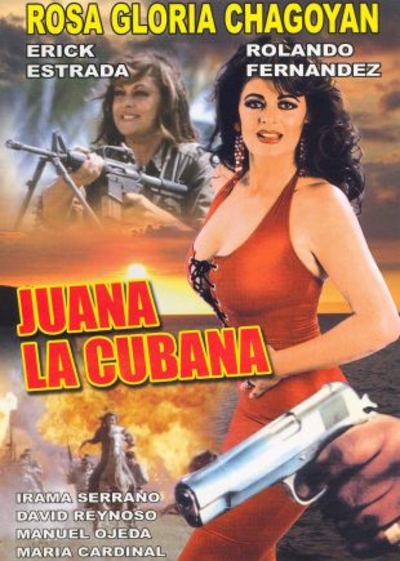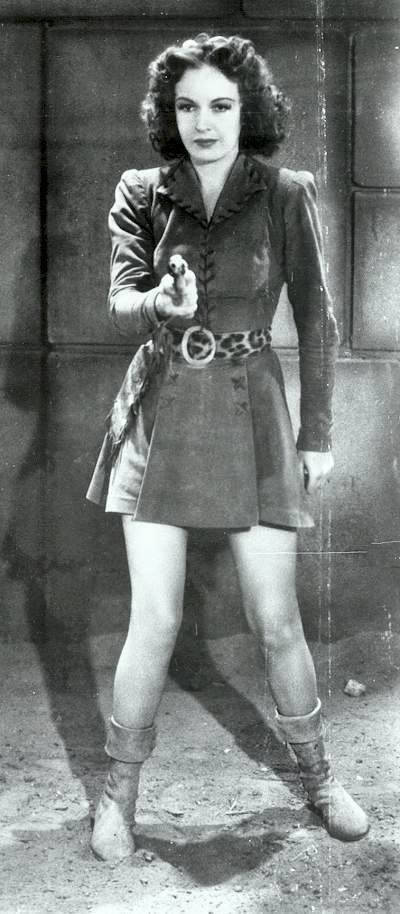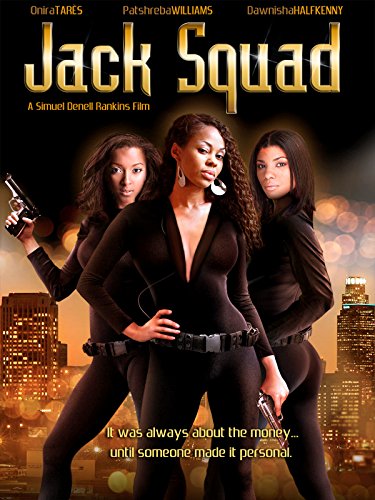★★★
“Showgirl by night, armed revolutionary by day.”
 A long time ago – 17 years or thereabouts! – we reviewed another Chagoyan/Fernandez production, La Guerrero Vengadora 2. It has taken me that long to find another of her films in a format I can understand without having to rope Chris into translating for me (I’d rather save the martyr points required for something more worthwhile). This follows Guerrero by three years, yet is more than slightly similar. In both, the heroine has a secret identity; and both also end with a helicopter going up against a rocket-launcher. Ok, technically it’s a bazooka here. Close enough for anti-government work. For that’s Chagoyan’s main pastime here, after her father was betrayed and executed by the unpleasant Colonel Pereza (Estrada).
A long time ago – 17 years or thereabouts! – we reviewed another Chagoyan/Fernandez production, La Guerrero Vengadora 2. It has taken me that long to find another of her films in a format I can understand without having to rope Chris into translating for me (I’d rather save the martyr points required for something more worthwhile). This follows Guerrero by three years, yet is more than slightly similar. In both, the heroine has a secret identity; and both also end with a helicopter going up against a rocket-launcher. Ok, technically it’s a bazooka here. Close enough for anti-government work. For that’s Chagoyan’s main pastime here, after her father was betrayed and executed by the unpleasant Colonel Pereza (Estrada).
To this end, her formal job is as the title character, the star of a nightclub show, where she sings, dances and wears costumes which are capable of blocking out the sun. This gives her access to all the high officials, including her lover, Colonel Montero. But when not performing moderately well-staged musical numbers, she is also Commander Zeta, leading the rebels from the front. She gets some help from the CIA, because it turns out the concentration camp set up by the regime, populated by captured rebels, is being use to provide subjects for a germ warfare project, under the control of an Iraqi scientist. So between stopping that, taking revenge on Pereza and performing complicated cabaret numbers twice nightly, Juana has quite the to-do list.
It is, of course, utterly implausible nonsense, which barely stands up to a first glance, never mind a second one. However, the saving grace is that everyone involved, not least Chagoyan, goes at it with admirable seriousness. The rebels believe in Commander Zeta, the authorities believe in Commander Zeta, and undeniably, Commander Zeta deeply believes in Commander Zeta. Nowhere is this more evident than when she whips her top off to lure government forces into an ambush. I guess it’s fortunate none of the soldiers to whom she bares her breasts, have ever been to her nightclub. But in terms of action, the resulting battle between tanks and horses is likely the film’s best work. It ends in Chagoyan catching a lit Molotov cocktail out of the air, and slam-dunking it down a tank hatch.
Admittedly, that isn’t quite as good as that sounds – it’s only barely lit. But considering the time and place this was made (1994 Mexico), this is impressively progressive. Juana is a decent heroine, not needing a man, yet still capable of loving one. Though by the time we reach the face-off against that helicopter, the body count has been surprisingly high. There are, admittedly, at least two musical numbers too many, to the point where this felt more like a Bollywood production on occasion. However, this was likely still better than I expected given its origins, and I was entertained to a quite acceptable degree.
Dir: Raul Fernandez Jr.
Star: Rosa Gloria Chagoyan, Erik Estrada, Rolando Fernández, Manuel Ojeda






 This is nominally based on Edgar Rice Burroughs’s 1932 novel of the same name, also known as The Land of Hidden Men. Though there’s very little beyond the title in common. The book was set in Cambodia, and told the story of explorer Gordon King, who finds a civilization which has been lost for a thousand years. This… isn’t. It is instead the story of Nyoka Meredith (Gifford), the daughter of a doctor working with the Masamba tribe in the middle of Africa. “Nyoka” is Swahili for snake, and she seems to spend most of her free time swinging through the forest on vines.
This is nominally based on Edgar Rice Burroughs’s 1932 novel of the same name, also known as The Land of Hidden Men. Though there’s very little beyond the title in common. The book was set in Cambodia, and told the story of explorer Gordon King, who finds a civilization which has been lost for a thousand years. This… isn’t. It is instead the story of Nyoka Meredith (Gifford), the daughter of a doctor working with the Masamba tribe in the middle of Africa. “Nyoka” is Swahili for snake, and she seems to spend most of her free time swinging through the forest on vines. This is as much about the philosophical underpinnings of karate, and how it can be used for personal growth. The instigator in this case is Chae-yeong (Jung), a teenage girl who has just transferred to a new school after issues at her previous educational establishment. Her long-suffering father, a karate master has barely registered her there, when trouble finds Chae-yeong. She uses her skills to rescue a student, Jong-goo (Oh), who is refusing to help some bullies cheat in an upcoming exam. This turns out to get her an unwanted high profile, as the school is basically a gangsters’ paradise.
This is as much about the philosophical underpinnings of karate, and how it can be used for personal growth. The instigator in this case is Chae-yeong (Jung), a teenage girl who has just transferred to a new school after issues at her previous educational establishment. Her long-suffering father, a karate master has barely registered her there, when trouble finds Chae-yeong. She uses her skills to rescue a student, Jong-goo (Oh), who is refusing to help some bullies cheat in an upcoming exam. This turns out to get her an unwanted high profile, as the school is basically a gangsters’ paradise. At 85 minutes, this might have been fine. For it’s a fairly simple tale, of three women who decide to escape their financial woes by drugging and robbing married men, banking on their victims not being willing to involve the authorities. While this initially works as planned, inevitably, they end up targeting the wrong guy, a minion of feared drug dealer Grey (Anderson). How evil is he? Grey appears to have an employee whose full-time job is to fan him. That’s some Evil Overlord style, right there. Grey doesn’t just want his stolen money back, he wants the trio to continue their activities – for his benefit. And that isn’t the only problem which the trio face, with Tony, the estranged other half of Dawn (Tares), unhappy at her having escaped their abusive relationship.
At 85 minutes, this might have been fine. For it’s a fairly simple tale, of three women who decide to escape their financial woes by drugging and robbing married men, banking on their victims not being willing to involve the authorities. While this initially works as planned, inevitably, they end up targeting the wrong guy, a minion of feared drug dealer Grey (Anderson). How evil is he? Grey appears to have an employee whose full-time job is to fan him. That’s some Evil Overlord style, right there. Grey doesn’t just want his stolen money back, he wants the trio to continue their activities – for his benefit. And that isn’t the only problem which the trio face, with Tony, the estranged other half of Dawn (Tares), unhappy at her having escaped their abusive relationship. Certainly the kind of action film for which you need to suspend your disbelief. In this case, the closest parallel is, as the tag-line above implies, the Jason Statham vehicle, Crank. In it, Statham’s character was poisoned, and had to keep his adrenaline permanently up for the rest of the film. to avoid dying. Here, it’s almost the reverse. Beckinsale’s character, Lindy, was born with a rare condition, “intermittent explosive disorder”. This is pretty much what it sounds like: uncontrollable aggressive outbursts, like a physical version of Tourette’s. This is a real thing. Not so real? Lindy is also “blessed” with high levels of cortisol, which make her faster and stronger than anyone else. Somewhere in the middle? Lindy controls her IED with electric shocks from a handheld device given to her by her therapist, Dr. Munchin (Tucci). All told, I’m tagging this as SF. #ChangeMyMind
Certainly the kind of action film for which you need to suspend your disbelief. In this case, the closest parallel is, as the tag-line above implies, the Jason Statham vehicle, Crank. In it, Statham’s character was poisoned, and had to keep his adrenaline permanently up for the rest of the film. to avoid dying. Here, it’s almost the reverse. Beckinsale’s character, Lindy, was born with a rare condition, “intermittent explosive disorder”. This is pretty much what it sounds like: uncontrollable aggressive outbursts, like a physical version of Tourette’s. This is a real thing. Not so real? Lindy is also “blessed” with high levels of cortisol, which make her faster and stronger than anyone else. Somewhere in the middle? Lindy controls her IED with electric shocks from a handheld device given to her by her therapist, Dr. Munchin (Tucci). All told, I’m tagging this as SF. #ChangeMyMind While ultimately hamstrung, not least by its limited resources – this cost a mere five thousand dollars – it does what low-budget films should generally tend to do. That is, go where their better-off siblings dare not tread. In this case, that’s the forbidden territory of religion. Two young, female missionaries, Amber (Durand) and Martha (Crosland) are going door-to-door, seeking souls they can save and bring into the body of their church – clearly Mormon, going by the reference to Salt Lake City among other things, though operating under a pseudonym here! While their attractive shape proves successful at getting them in the door, the residents who don’t live up to the ladies’ high moral standards are in for a shock. For the two kill non-believers, with Amber in particular, having a zero tolerance policy. And she considers herself “saved”, basically giving her a free pass to do anything necessary in the name of the Lord.
While ultimately hamstrung, not least by its limited resources – this cost a mere five thousand dollars – it does what low-budget films should generally tend to do. That is, go where their better-off siblings dare not tread. In this case, that’s the forbidden territory of religion. Two young, female missionaries, Amber (Durand) and Martha (Crosland) are going door-to-door, seeking souls they can save and bring into the body of their church – clearly Mormon, going by the reference to Salt Lake City among other things, though operating under a pseudonym here! While their attractive shape proves successful at getting them in the door, the residents who don’t live up to the ladies’ high moral standards are in for a shock. For the two kill non-believers, with Amber in particular, having a zero tolerance policy. And she considers herself “saved”, basically giving her a free pass to do anything necessary in the name of the Lord. Jesse (Finochio) is a Long Island cop on the edgeTM. Since losing custody of her kids, she has gone into a downward spiral of drinking, casual relationships and taking her anger out on any perps unfortunate enough to cross her path. She has driven her captain (Vario) to the edge of distraction, and is perpetually feuding with her mother and brother. The latter dies in a road accident – only his foot is found! – but when Jesse and Mom go to cash in his life insurance policy, they get a shock. The beneficiary has been changed to be Ralph Sirna (Trentacosta), a notorious local gangster. Suddenly, the accident seems rather less accidental, and nothing – not her boss nor Sirna’s “godfather”, Vince (Forsythe) – will be able to stop her.
Jesse (Finochio) is a Long Island cop on the edgeTM. Since losing custody of her kids, she has gone into a downward spiral of drinking, casual relationships and taking her anger out on any perps unfortunate enough to cross her path. She has driven her captain (Vario) to the edge of distraction, and is perpetually feuding with her mother and brother. The latter dies in a road accident – only his foot is found! – but when Jesse and Mom go to cash in his life insurance policy, they get a shock. The beneficiary has been changed to be Ralph Sirna (Trentacosta), a notorious local gangster. Suddenly, the accident seems rather less accidental, and nothing – not her boss nor Sirna’s “godfather”, Vince (Forsythe) – will be able to stop her.
 It’s about the year 1880, and Jessica Hartwell (Currie) is heading out West in a wagon with her preacher husband. They encounter the gang of Frank Brock (Frank); they repeatedly rape Jessica, before shooting her husband fatally, and leaving her for dead. She survives, returning to health with the help of prospector Rufe, who sports an unfortunate, obviously fake beard, yet also teaches the young woman how to shoot. For Jessi has vengeance on her mind, and to assist her in this path, she liberates three other women from the custody of Sheriff Clay (Lund). There’s outlaw Rachel (Jennifer Bishop); saloon girl Claire (Regina Carrol); and Indian Kana (the not-exactly Indian Stern), who had been a part of Frank’s gang until he abandoned her.
It’s about the year 1880, and Jessica Hartwell (Currie) is heading out West in a wagon with her preacher husband. They encounter the gang of Frank Brock (Frank); they repeatedly rape Jessica, before shooting her husband fatally, and leaving her for dead. She survives, returning to health with the help of prospector Rufe, who sports an unfortunate, obviously fake beard, yet also teaches the young woman how to shoot. For Jessi has vengeance on her mind, and to assist her in this path, she liberates three other women from the custody of Sheriff Clay (Lund). There’s outlaw Rachel (Jennifer Bishop); saloon girl Claire (Regina Carrol); and Indian Kana (the not-exactly Indian Stern), who had been a part of Frank’s gang until he abandoned her. Born as Maya, the heroine here adopted the name of “Jet” when she became part of a seriously black ops group, part of the Israeli intelligence service known as the Mossad. There, she and her colleagues had carried out thoroughly deniable operations against… well, supposedly Israel’s enemies, though it’s not as if she asks questions. The secrecy wasn’t limited to her work, as she carried on an unsanctioned relationship with David, the man in charge of the group. But eventually, it all became too much: with David’s assistance, Jet faked her own death on a mission and vanished off the grid, re-appearing as “Carla” in Trinidad, where she enjoyed a quiet life for several years. That came to a sudden end when assassins make an attempt to terminate her new identity. Her cover has clearly been blown. The questions are: what happened, who is responsible, and how can Maya a.k.a. Jet a.k.a. Carla restore the balance?
Born as Maya, the heroine here adopted the name of “Jet” when she became part of a seriously black ops group, part of the Israeli intelligence service known as the Mossad. There, she and her colleagues had carried out thoroughly deniable operations against… well, supposedly Israel’s enemies, though it’s not as if she asks questions. The secrecy wasn’t limited to her work, as she carried on an unsanctioned relationship with David, the man in charge of the group. But eventually, it all became too much: with David’s assistance, Jet faked her own death on a mission and vanished off the grid, re-appearing as “Carla” in Trinidad, where she enjoyed a quiet life for several years. That came to a sudden end when assassins make an attempt to terminate her new identity. Her cover has clearly been blown. The questions are: what happened, who is responsible, and how can Maya a.k.a. Jet a.k.a. Carla restore the balance?